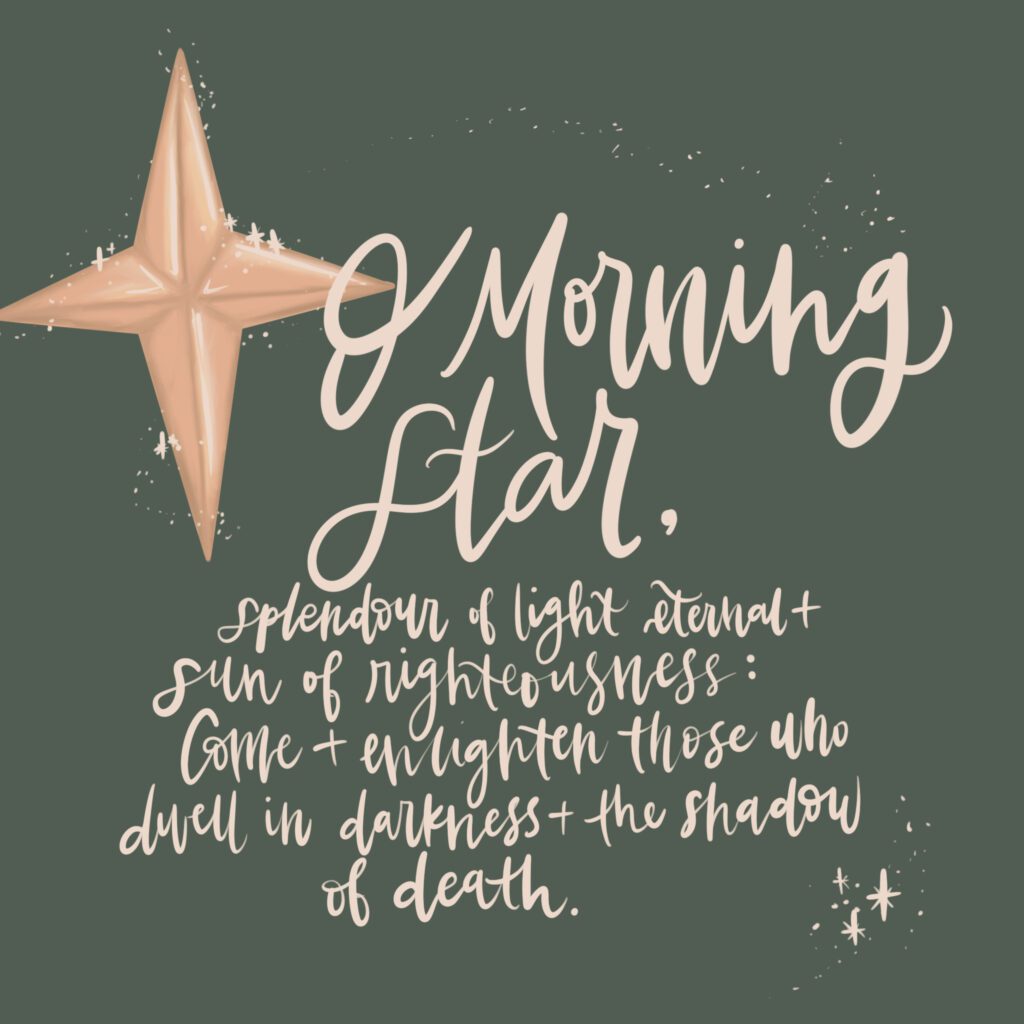 Dec. 21 What steals your joy? ANTIPHON “O Rising Dawn, Radiance of the Light eternal, and Sun of Justice. Come and enlighten those who sit in darkness and in the shadow of death.” EXPLANATION Jesus’ birth brings hope and joy to sinners. This antiphon refers in part to the prophecy of Malachi: “The sun of righteousness will rise, with healing in its wings; and you will go on leaping like calves from the stall” (Mal 3:20). It also alludes to the canticle of Zechariah: “The dawn from on high shall break upon us, to shine on those who dwell in darkness” (Lk 1:78-79). Moreover, these words remind us of the joy of Christ’s coming and his message: “I have told you this so that my joy may be in you and that your joy may be complete” (Jn 15:11). MEDITATION Joy is much more than feeling happy. Real joy remains even in difficult times. It is firm because it is centered on a radical trust in Christ. The true disciple has Christ as a sun in the darkness, for he knows that “in all things, God works for the good of those who love him” (Rom 8:28). St. Paul and Silas are an example of this: After being beaten and imprisoned, they sang hymns to the Lord (Acts 16:23-25). What steals your joy? When something steals your joy today, ask Jesus, the true Sun, to enter into that darkness. Say to him: “Jesus, I trust in you”. PRAYER My Jesus, you shine your light on those who seek your face. I beg you to strengthen me in hope. Lord, in you I trust. Give me the joy of your salvation. |
| What are the “O Antiphons”? FR. WILLIAM SAUNDERS The O Antiphons refer to the seven antiphons that are recited (or chanted) preceding the Magnificat during Vespers of the Liturgy of the Hours. They cover the special period of Advent preparation known as the Octave before Christmas, Dec. 17-23, with Dec. 24 being Christmas Eve and Vespers for that evening being for the Christmas Vigil. The exact origin of the O Antiphons is not known. Boethius (c. 480-524) made a slight reference to them, thereby suggesting their presence at that time. At the Benedictine abbey of Fleury (now Saint-Benoit-sur-Loire), these antiphons were recited by the abbot and other abbey leaders in descending rank, and then a gift was given to each member of the community. By the eighth century, they are in use in the liturgical celebrations in Rome. The usage of the O Antiphons was so prevalent in monasteries that the phrases, Keep your O and The Great O Antiphons were common parlance. One may thereby conclude that in some fashion the O Antiphons have been part of our liturgical tradition since the very early Church. The importance of O Antiphons is twofold: Each one highlights a title for the Messiah: O Sapientia (O Wisdom), O Adonai (O Lord), O Radix Jesse (O Root of Jesse), O Clavis David (O Key of David), O Oriens (O Rising Sun), O Rex Gentium (O King of the Nations), and O Emmanuel. Also, each one refers to the prophecy of Isaiah of the coming of the Messiah. Let’s now look at each antiphon with just a sample of Isaiah’s related prophecies : O Sapientia: O Wisdom, O holy Word of God, you govern all creation with your strong yet tender care. Come and show your people the way to salvation. Isaiah had prophesied, The spirit of the Lord shall rest upon him: a spirit of wisdom and of understanding, a spirit of counsel and of strength, a spirit of knowledge and fear of the Lord, and his delight shall be the fear of the Lord. (Isaiah 11:2-3), and Wonderful is His counsel and great is His wisdom. (Isaiah 28:29). O Adonai: O sacred Lord of ancient Israel, who showed yourself to Moses in the burning bush, who gave him the holy law on Sinai mountain: come, stretch out your mighty hand to set us free. Isaiah had prophesied, But He shall judge the poor with justice, and decide aright for the lands afflicted. He shall strike the ruthless with the rod of his mouth, and with the breath of his lips he shall slay the wicked. Justice shall be the band around his waist, and faithfulness a belt upon his hips. (Isaiah 11:4-5); and Indeed the Lord will be there with us, majestic; yes the Lord our judge, the Lord our lawgiver, the Lord our king, he it is who will save us. (Isaiah 33:22). |


